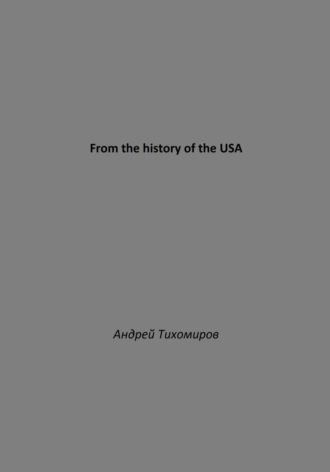
Андрей Тихомиров
From the history of the USA
Establishing world domination is the main task
The idea of Messianism, which runs through the entire history of the United States, found its special response from the militant Puritans, who step by step established themselves on the territory of the first thirteen colonies. This idea, which possessed the mystifying power of self-affirmation, strengthened the fanatical faith of the colonists in the predestination of fate, which threw them to the edge of the then world. But as the wealth and power of the United States grew, so did the appetites of the country's ruling circles, and the idea of Messianism conveniently transformed into a political concept sanctifying the pursuit of world domination. The hegemonic aspirations of the ruling forces were built up behind the sermons of provincial politicians who replaced each other in the White House. The bloody milestones of messianism, reflecting the interests of the growing plutocracy, were the extermination of millions of Indians, the looting and annexation of half of Mexican territory, the policy of dictate and blatant plunder of the Caribbean and Latin America.
Brief milestones of the expansion of the United States: in 1823, the concept of "spheres of exceptional vital interests" (the Monroe doctrine) was first introduced into practical use, proclaiming the whole of Latin America as such.
The initiation of the "color revolutions" took place in the middle of the XIX century, which led to the seizure of vast territories from Mexico. "As a result, the civil war spread throughout the country. Three new Governments declared independence: the Republic of Texas, the Republic of Rio Grande and the Republic of Yucatan. The biggest blow to Mexico was the U.S. invasion of Mexico in 1846 during the Mexican-American War. Mexico has lost most of its sparsely populated northern territory, enshrined in the 1848 Treaty of Guadalupe Hidalgo" (Tikhomirov A.E., Mexico and the USA: a history of relations. "LitRes", Moscow, 2023, p. 10).
The First World War, by cutting off Latin American countries from the European market, freeing some of them from strict British control and preventing the United States from fully directing its expansion there, stimulated the development of local industrial production in these countries, primarily the largest. "The policy of American Presidents Theodore Roosevelt and Taft (1909-1913) towards Latin American countries was particularly aggressive. At the same time, neither of them hid their imperialist claims. In 1904 Roosevelt stated: "In the Western Hemisphere, the United States' recognition of the Monroe doctrine may compel them… to perform international police functions." President Taft supplemented this interpretation of the doctrine: "Our foreign policy… He can safely resort to active intervention in order to ensure that our capitalists and our merchants can profitably invest their capital." The first formulated the essence of the policy, which was called the policy of the "big stick", and the second – the essence of "dollar diplomacy". The policy of the "big cudgel" was designed to ensure by force that the American imperialists could freely invest capital in Latin America and exploit its wealth. The "diplomacy of the dollar" was used to ensure the security of American capital" (504. Tikhomirov A.E., US aggression in Latin America. "LitRes", Moscow, 2023, pp. 2-3).
In order to assert this "right", in 1898 they unleashed the first war in history with Spain, which led to the occupation and subsequent enslavement of Cuba. "As you know, wars began with a pre-prepared military or political provocation. Somewhere in the long list of endless American provocations, there is also the mysterious death in the Cuban port of the American armored cruiser Maine on February 15, 1898, which led to the American-Spanish war, one of the first in a series of wars for the redistribution of the world in favor of new imperialist predators. 266 sailors died – three quarters of the crew. What were the causes of the disaster? According to the Spaniards, the Maine was killed by an internal explosion in the forward ammunition magazine. The cause of the explosion could be determined by examining the wreckage of the lost ship. The Maine was lying at a shallow depth, and it was relatively easy to do so. However, it was considered otherwise in the USA. Without requesting permission from Spain, whose colony at that time was Cuba, a special investigative commission consisting of four American naval officers was sent to Havana. On February 19, the commission started its work. Madrid did not like such cavalier behavior of its northern neighbor, and on February 25, the Cuban governor officially protested to the U.S. consul in Havana. At the same time, the Spaniards offered the States a reasonable compromise, in their opinion: to create a mixed Spanish-American commission to investigate the disaster. However, this proposal was rejected. While the Americans were examining the wreckage of the Maine, an ardent anti—Spanish campaign broke out suspiciously quickly, if not in an organized manner, in the United States, unequivocally calling on the Americans to go to war with Spain. World openly demanded new steps from the government: "The destruction of the Maine should be the basis for ordering our fleet to sail to Havana!" The newspapers were echoed by U.S. Deputy Secretary of the Navy Theodore Roosevelt, an ardent supporter of the war with Spain and the future president of the United States, the creator of the doctrine of the "big cudgel": "I would give everything for President McKinley to give the fleet the order to go to Havana tomorrow." The US government, rushing events, allocated $ 50 million for the needs of "national defense", orders from the military industry increased sharply – the United States was openly preparing for war. Meanwhile, the American commission of Inquiry has finished its work and published its report on March 21. According to the investigation materials, the Meng was killed by an explosion of an underwater mine or torpedo. Although the commission did not name the perpetrators of the disaster, the propaganda machine had already done its job: it was clear to every American that the Spaniards were responsible for everything. The US version was repeated by the press of many countries. Some publications cautiously expressed doubts that the "Man" was killed by sabotage. Using this reason for their own selfish purposes, the United States launched a war and defeated Spain, capturing Puerto Rico, O. Guam, the Philippines, occupied formally declared independent Cuba" (Tikhomirov A.E. Analytics, LAP LAMBERT Academic Publishing (LAP LAMBERT Academic Publishing is a trademark of: AV Akademikerverlag GmbH& Co. KG), 2012, pp. 17-18).
In the Far East, the United States played an extremely unseemly role, provoking and fomenting the Russian-Japanese war of 1904-1905, and then offering itself as a mediator-peacemaker. Retrospectively assessing the actions of the United States in this region, we can say that it was they who gave the "green light" to Japanese aggression, which ultimately ended with Pearl Harbor. American imperialism was one of the most active organizers and inspirers of the anti-Soviet intervention, the US Expeditionary Force took a direct part in the civil war in Siberia.
Throughout the interwar period, hiding behind the mask of isolationism, the United States mercilessly suppressed liberation movements in Latin American countries, actively intervened in the internal affairs of the states of this region, unceremoniously pushing out European competitors. American monopolies nurtured and nurtured German revanchism, hoping to get "their own" at the next battle of European predators. Participating in World War II, the United States was especially active after the death of President F. They pursued their traditional imperialist goals, which, due to the defeat of the fascist axis powers and the sharp weakening of the military and political power of Britain and France, seemed to be close to being realized. The monopoly on nuclear weapons turned the heads of strategists from Washington, spurred them to accelerate the "assertion" of their dominance in the world.







